Other uses
- Hundred Year Flood , an album by progressive metal band Magellan
A 100-year flood is a flood event that has a 1% probability of occurring in any given year.
100-year flood may also refer to:

Lake Eyre, officially known as Kati Thanda–Lake Eyre, is an endorheic lake in east-central Far North South Australia, some 700 km (435 mi) north of Adelaide. The shallow lake is the depocentre of the vast endorheic Lake Eyre basin, and contains the lowest natural point in Australia at approximately 15 m (49 ft) below sea level (AHD), and on the rare occasions that it fills completely, is the largest lake in Australia covering an area up to 9,500 km2 (3,668 sq mi). When the lake is full, it has the same salinity level as seawater, but becomes hypersaline as the lake dries up and the water evaporates.

A flood is an overflow of water that submerges land that is usually dry. In the sense of "flowing water", the word may also be applied to the inflow of the tide. Floods are an area of study of the discipline hydrology and are of significant concern in agriculture, civil engineering and public health. Human changes to the environment often increase the intensity and frequency of flooding, for example land use changes such as deforestation and removal of wetlands, changes in waterway course or flood controls such as with levees, and larger environmental issues such as climate change and sea level rise. In particular climate change's increased rainfall and extreme weather events increases the severity of other causes for flooding, resulting in more intense floods and increased flood risk.
The International Dublin Literary Award, established as the International IMPAC Dublin Literary Award in 1996, is presented each year for a novel written or translated into English. It promotes excellence in world literature and is solely sponsored by Dublin City Council, Ireland. At €100,000, the award is one of the richest literary prizes in the world. If the winning book is a translation, the prize is divided between the writer and the translator, with the writer receiving €75,000 and the translator €25,000. The first award was made in 1996 to David Malouf for his English-language novel Remembering Babylon.

A floodplain or flood plain or bottomlands is an area of land adjacent to a river which stretches from the banks of its channel to the base of the enclosing valley walls, and which experiences flooding during periods of high discharge. The soils usually consist of clays, silts, sands, and gravels deposited during floods.
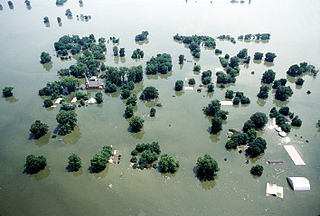
A 100-year flood is a flood event that has a 1 in 100 chance of being equaled or exceeded in any given year.
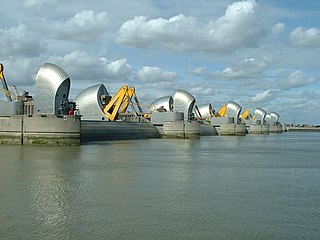
The Thames Barrier is a retractable barrier system built to protect the floodplain of most of Greater London from exceptionally high tides and storm surges moving up from the North Sea. It has been operational since 1982. When needed, it is closed (raised) during high tide; at low tide, it can be opened to restore the river's flow towards the sea. Built about 2 miles east of the Isle of Dogs, its northern bank is in Silvertown in the London Borough of Newham and its southern bank is in the New Charlton area of the Royal Borough of Greenwich.
Cessair or Cesair is a character from the Lebor Gabála Érenn, a medieval Christian pseudohistory of Ireland. According to the Lebor Gabála, Cessair was the leader of the first inhabitants of Ireland, arriving before the biblical flood. The tale may have been an attempt to Christianize an earlier pagan myth, but may also have been the product of post-conversion pseudohistory.
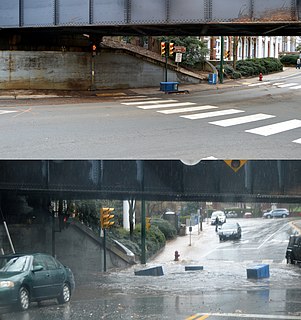
A flash flood is a rapid flooding of low-lying areas: washes, rivers, dry lakes and depressions. It may be caused by heavy rain associated with a severe thunderstorm, hurricane, or tropical storm, or by meltwater from ice or snow flowing over ice sheets or snowfields. Flash floods may also occur after the collapse of a natural ice or debris dam, or a human structure such as a man-made dam, as occurred before the Johnstown Flood of 1889. Flash floods are distinguished from regular floods by having a timescale of fewer than six hours between rainfall and the onset of flooding.
The Environment Agency (EA) is a non-departmental public body, established in 1996 and sponsored by the United Kingdom government's Department for Environment, Food and Rural Affairs, with responsibilities relating to the protection and enhancement of the environment in England.
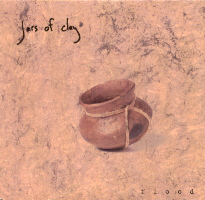
"Flood" is a song written and performed by Jars of Clay. It is considered to be their breakthrough song due to airplay on contemporary Christian music and alternative rock radio stations, two radio formats which rarely intersect. It was released in 1995 on their self-titled debut album. The album remained in the top 60 albums for much of the year and remained in Billboard 200 for an entire 52-week (one-year) cycle. The album went gold and, shortly after, attained platinum status. The debut album has now sold well over 2,000,000 copies.
A return period, also known as a recurrence interval or repeat interval, is an average time or an estimated average time between events such as earthquakes, floods, landslides, or river discharge flows to occur.

A flood basalt is the result of a giant volcanic eruption or series of eruptions that covers large stretches of land or the ocean floor with basalt lava. Many flood basalts have been attributed to the onset of a hotspot reaching the surface of the earth via a mantle plume. Flood basalt provinces such as the Deccan Traps of India are often called traps, after the Swedish word trappa, due to the characteristic stairstep geomorphology of many associated landscapes.
BFE may refer to:

"Take a Picture" is a song by American rock band Filter, released to radio in September 1999 as the second single from their second studio album, Title of Record (1999). The song became a hit at the start of 2000 following its January 18 retail release, peaking at number 12 on the US Billboard Hot 100 and number three in Canada. It also became a top-ten hit in New Zealand, peaking at number eight on the RIANZ Singles Chart.

Pakistan's climate is a continental type of climate, characterized by extreme variations in temperature, both seasonally and daily, because it is located on a great landmass north of the Tropic of Cancer.

The 2010 Ladakh floods occurred on 6 August 2010 across a large part of Ladakh, then part of the state of Jammu and Kashmir. 71 towns and villages were damaged, including the main town in the area, Leh. At least 255 people are reported to have died, six of whom were foreign tourists, after a cloudburst and heavy overnight rains triggered flash floods, mudflows, and debris flows. 200 people were reported missing in the initial aftermath of the storm, and thousands more were rendered homeless after the flooding caused extensive damage to property and infrastructure. Overall, 9000 people were directly affected by the event.
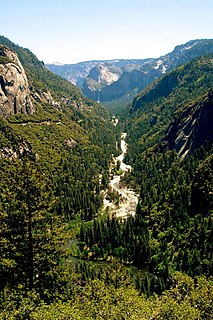
The January 1997 flood of the Merced River occurred from December 31, 1996, to January 5, 1997, throughout the Yosemite Valley in Yosemite National Park, Mariposa County, California, US. The flood stands as arguably the park's worst natural disaster to date, and inarguably the worst flood in park history. The Merced River at Happy Isles peaked at 10,100 cubic feet per second during the flood. A book was written on the flood later in 1997 by Mark Goodin titled Yosemite: The 100-Year Flood.
Amazon's Best Books of the Year is a list of best books created yearly by Amazon.com. It is a list of best books picked by Amazon editors and customers. It began in 2000. Customer favorites are ranked according to the number of sales made through October, for books published in that calendar year. The lists are usually announced in early November. The list has garnered attention from media such as The Guardian, CBS News and others.

James Gabriel Keogh, known professionally as Vance Joy, is an Australian singer and songwriter and former Australian Rules Footballer. He signed a five-album deal with Atlantic Records in 2013. He released his debut EP God Loves You When You're Dancing in March 2013. His song "Riptide" was voted number 1 on the 2013 Triple J Hottest 100. Joy released his debut studio album Dream Your Life Away on 5 September 2014 in Australia and on 9 September 2014 elsewhere. At the ARIA Music Awards of 2015, he won Best Male Artist. His second studio album, Nation of Two, was released in 2018. Vance Joy spent time in the Zac Brown Band as vocals.